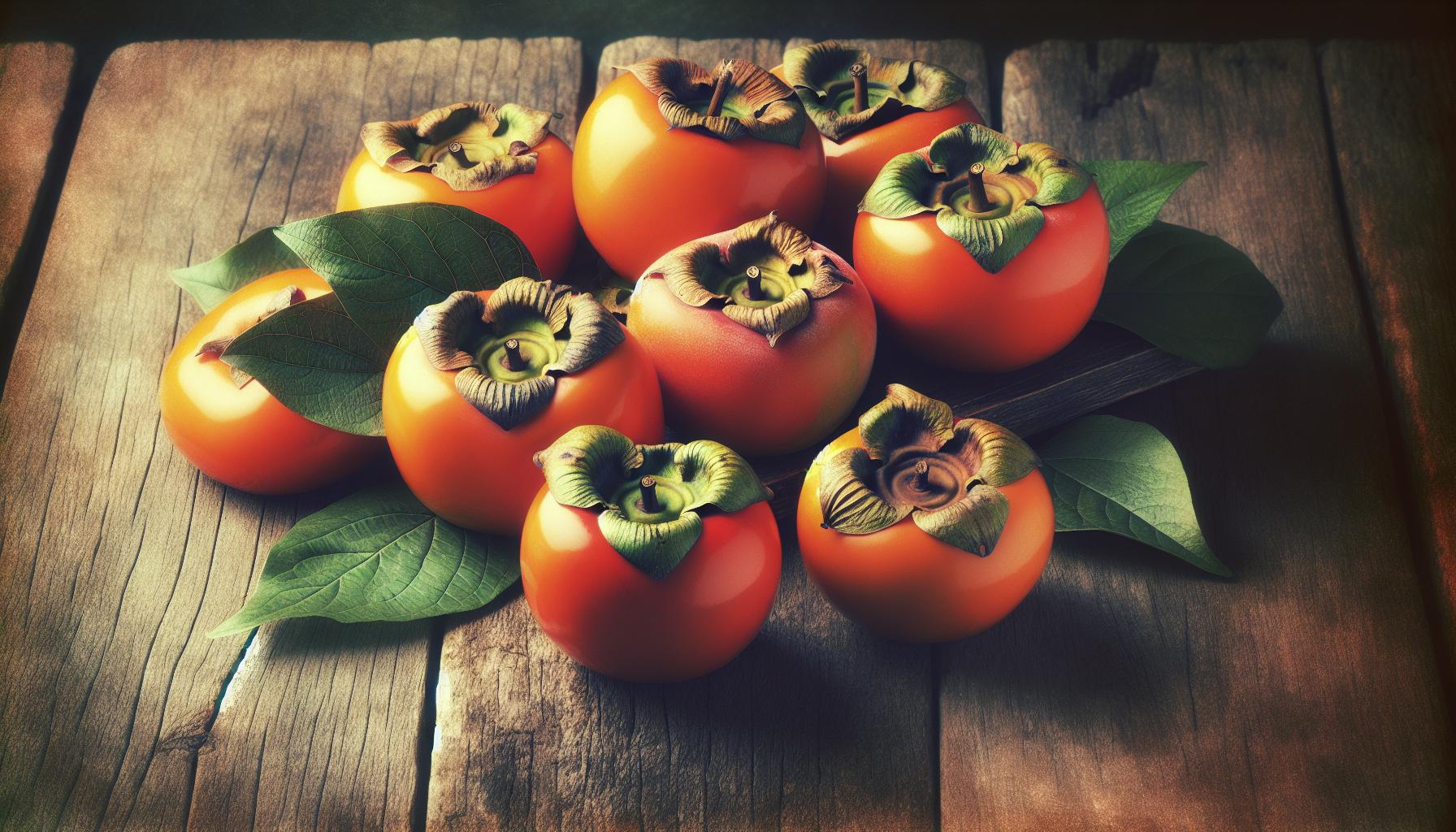As I snuggle into my favorite chair with a warm cup of tea, the winter chill outside seems to whisper tales of nature’s hidden treasures. Among these are the vibrant winter fruits, each one a burst of color and flavor waiting to be discovered. These juicy gems aren’t just delightful to the palate; they’re nature’s way of keeping us healthy and strong through the frosty days.
Imagine biting into a crisp apple or savoring the sweet tang of a ripe orange. These fruits, rich in vitamins and antioxidants, offer more than just nourishment; they promise vitality and warmth. Adding them to our daily routine can help maintain healthy blood pressure, boost metabolism, and fortify our immune system.
As I delve deeper into this fruity wonderland, I find joy in the unexpected—a treasure trove of health benefits wrapped in nature’s sweetest gifts. It’s a story worth sharing, a delightful secret passed from one friend to another.
Discover Top Winter Season Fruits
Winter can sometimes feel like Mother Nature hit the snooze button a bit too long. But, fear not—I’ve got a lineup of winter rockstars that’ll jazz up those frosty months. These juicy gems aren’t just eye candy; they’re packed with health benefits that’ll have your body singing praises louder than your shower concerts.
- Oranges: The Vitamin C Powerhouse
Oranges are like the sun rising in your kitchen. Not only do they deliver a juicy punch of flavor, but they’re also brimming with vitamin C. This vitamin is the superhero your immune system didn’t know it needed, helping you fend off those pesky winter colds. Plus, believe it or not: their zesty aroma can boost your mood—talk about a win-win! - Pomegranates: Red Rubies of Antioxidants
Who doesn’t love the drama of opening a pomegranate? These little red rubies are antioxidant powerhouses, great for combating inflammation and enhancing heart health. Pomegranates make perfect companions to your breakfast smoothie or salad, adding a sweet surprise to your taste buds. They’re the gift that keeps on giving, one juicy seed at a time. - Kiwis: The Fuzzy Wellness Nugget
Don’t judge a fruit by its cover, folks. Beneath that fuzzy exterior lies a tangy vitamin C treasure chest. Kiwis are also rich in fiber and potassium, which means they’re fantastic for digestion and maintaining healthy blood pressure. Slice ‘em up and let the fun begin—your tummy will thank you. - Pears: Sweet, Silky, and Fiber-Rich
Pears are the subtle seducers of the fruit world. Their sweet, silky texture makes for a delightful snack, and they’re full of dietary fiber, promoting healthy digestion. They pair nicely (pun intended) with cheese or on their own for a mid-afternoon treat. Go ahead, give in—the fiber love won’t disappoint. - Clementines: Little Orbs of Joy
These baby oranges are the saviors of snack time on a gloomy day. Easy to peel and ridiculously sweet, clementines are loaded with vitamin C, which means they help keep colds at bay. Pop a few in your bag and embrace that portable sunshine. Feeling down? Clementines got your back.
So, head over to the produce aisle and grab these fruity winter warriors! They’ll brighten your days, keep you healthy, and make those chilly months a little more bearable. Trust me, your taste buds and immune system will be throwing you a thank-you party.
Benefit From Citrus Fruits

Winter feels like a party when those golden citrus fruits roll around! They’re here to blast away your winter blues, with flavors so bright they could light up the entire season. Let’s dive into my citrus wonderland, with oranges and grapefruits at the top of the guest list.
Oranges
Oranges, the little vitamin C superheroes, are always ready to save my day from seasonal sniffles. Packed with potassium, fiber, and a good sprinkle of sunshine, they help keep my immune system sharp and my mood a notch above fabulous. I love throwing a few slices into my salad or simply peeling them for an easy, tangy snack. Don’t just admire their cheery color—bite into that zest and let the citrusy goodness work its magic!
Savor Delicious Pomegranates

Imagine cracking open a pomegranate and being greeted by a burst of ruby-red seeds, each one glistening with juicy goodness. That’s the magic of pomegranates, my friends. These little jewel-like seeds aren’t just a treat for the eyes; they’re antioxidant powerhouses. Antioxidants fight off those pesky free radicals looking to age us faster than you can say “winter chill.”
But wait, there’s more. Studies suggest pomegranate juice might even give cholesterol levels a run for their money. It’s like getting a health boost wrapped in deliciousness! And let’s talk versatility. Pomegranate seeds can jazz up just about anything. Toss them into yogurt or salads, or use them to add a tangy twist to savory dishes.
Got a fridge? Great! Keep these sturdy beauties there, and they’ll stay fresh for up to two months. So, when pomegranate season hits from October to January, these gems are ready to brighten your day with their sweet-tart flavor.
Incorporate this fruity star into your winter spread, and let those seeds sprinkle a bit of vibrant magic into your meals. Who knew staying healthy could taste this lovely?
Enjoy Nutritious Apples

Who knew that munching on an apple could be your secret weapon this winter? I mean, really! Apples aren’t just for keeping doctors away; they’re for turbocharging your day too. Loaded with vitamin C, these crisp little powerhouses help boost your immune system so you can dodge the sniffles. And let’s not forget their fiber content, which keeps your gut as happy as a kid in a candy store.
Need a pick-me-up? Skip the caffeine-jitters and grab an apple instead. The natural sugars give you a steady energy boost without the crash and burn that comes with your coffee fix. Plus, apples are like the multitaskers of the fruit world—they taste amazing with just about anything. Slap some nut butter on them for a crunchy snack, and boom! You’ve got yourself a tasty and nourishing treat.
Oh, and did you know apples are pretty much tailor-made for winter? They’re in season, they’re everywhere, and they’re just the thing to brighten those cold, dreary days. Not to mention, these juicy gems help diabetic folks keep their blood sugar balanced, thanks to their sweet yet low-calorie goodness.
So next time you’re roaming the grocery aisles, toss a few apples in your cart. Not only will your body thank you, but you’ll also be rocking the healthiest snack game around.
Taste the Unique Persimmons

Persimmons: winter’s hidden gem that nobody’s talking about, but they should be. If you’ve never had one, imagine if an apricot and an apple had a deliciously funky love child. You can dive into these little flavor bombs from October through January. Whether you eat them like an apple, smoosh them into a smoothie, or slather them over a toast, they’re screaming versatility.
Not all persimmons are created equal, though. You’ve got your Fuyu—squatty little guys you can eat right away without waiting for the fruit equivalent of a sniper’s touch on your counter—and then there’s Hachiya, which needs to be softer than a marshmallow to avoid that unpleasant astringent surprise.
They don’t just taste good; they’re basically edible health boosters. Packed with vitamins A and C, they’re not just tidbits of taste—they’re glow-getters for your skin and warriors for your immune system. Got digestive issues? These guys have fiber that’ll make your gut happier than a kid in a candy store.
If you spot a persimmon next time you’re grocery shopping, give it a gentle squeeze—if it gives a little, it’s ready for its starring role in your meal. So next time you pass the produce aisle, remember you’re not just buying a persimmon, you’re getting a sweet, juicy ticket to better health. Now, go ahead and toss a few into your cart. Trust me, your taste buds and gut will thank you.
Reap the Health Benefits of Kiwifruit
So, you’ve got your cozy sweater and hot cocoa, but did you know there’s a little green powerhouse ready to join your winter lineup? I’m talking about kiwifruit. These fuzzy, odd-looking fruits may seem like an avocado’s equally awkward cousin, but don’t judge a fruit by its cover. Packed with more Vitamin C than your average orange, kiwis are like tiny nutrition ninjas fighting off winter blues.
Ever met anyone worried about catching a cold? Well, here’s your conversation starter: “Did you know kiwifruit can give your immune system a ninja-like boost?” The Vitamin C in kiwis is an antioxidant superhero that battles the evil free radicals trying to prematurely age you (and, let’s be honest, nobody wants to look older in Zoom calls these days).
But wait, there’s more! Kiwis aren’t just about Vitamin C heroics. They’ve got dietary fiber—a friend to all who’ve indulged a bit too much on holiday treats. Fiber keeps things moving smoothly… if you catch my drift. So, when you’re feeling those digestive woes, a kiwifruit a day can keep tummy troubles away.
And let’s not forget heart health. Who knew a little kiwi could play such a big part? These fruits help lower bad cholesterol, giving your heart a pat on the back—or maybe a gentle hug, they’re nice like that.
Next time you’re wandering the produce aisle, give those kiwis a wink and toss a few into your cart. They’re not just boosting your health; they’re giving you a reason to brag about your fruit choices. Plus, you might just convert a friend or two into the ways of the kiwi.
Explore Lesser-Known Winter Fruits
Let’s get wild and explore some winter fruits you probably didn’t even know were in season. These under-the-radar gems pack a punch, not just with flavor but with some serious health benefits too.
Papaya
Papayas are like the tropical island escape you dream about while stuck in a snowstorm. Loaded with vitamin C, papayas help keep colds at bay and are antioxidants pros. The enzymes in this sweet, creamy fruit could have your digestion thanking you with each juicy bite. Imagine a tropical punch in fruit form; that’s papaya for you. I love tossing them in smoothies or over yogurt for an exotic twist. Let’s be honest, anything that makes me feel like I’m on a beach in winter is a win.
Dates
Dates are the candy of the fruit world, minus the sugar overload. These sweet nuggets are high in fiber, so not only do they help get things moving (you know what I mean), but they also keep you full longer. Rich in potassium, dates support heart health, so it’s like a warm hug for your ticker. They’re perfect for snacking straight or adding a sweet kick to desserts. I even sneak them into energy bites for a quick pick-me-up. Who would’ve thought dates could be more than just a Friday night?
Conclusion
Embracing the bounty of winter fruits not only adds vibrant flavors to our meals but also supports our health during the colder months. From the immune-boosting power of citrus fruits to the antioxidant-rich goodness of pomegranates, these natural treasures offer a delicious way to enhance our well-being. Including a variety of fruits like apples, persimmons, and kiwis in our diet ensures we get a range of vitamins and nutrients that help combat winter blues. Let’s celebrate the season by indulging in these nutritious delights and savoring the warmth and vitality they bring to our lives.
Frequently Asked Questions
What are some highly recommended winter fruits for their health benefits?
Oranges, pomegranates, kiwis, pears, clementines, and apples are highly recommended during winter. These fruits are rich in vitamins, antioxidants, and fiber, offering numerous health benefits, such as boosting the immune system, aiding digestion, and providing sustained energy. Including these fruits in your diet can help enhance overall well-being during the colder months.
Why are citrus fruits especially beneficial in winter?
Citrus fruits, such as oranges and grapefruits, are rich in vitamin C, which boosts the immune system and helps ward off colds and flu. They also contain fiber and antioxidants that support heart health and improve mood. Their uplifting flavor makes them a delightful choice for combating the winter blues.
What makes pomegranates a beneficial addition to the winter diet?
Pomegranates are high in antioxidants, which help fight aging and support heart health. Their juice may improve cholesterol levels. They are visually appealing and versatile in various dishes. Pomegranates have a long shelf life, staying fresh for up to two months in the fridge, making them a convenient choice for adding nutrition and flavor to winter meals.
How do apples contribute to health during winter?
Apples are a winter superfood, rich in vitamin C and fiber. They boost the immune system and promote gut health. As they provide a steady energy release, apples make an ideal snack for keeping energy levels stable without causing a caffeine-related crash. They are in season during winter, making them a convenient and nutritious option.
What are the benefits of adding persimmons to your winter diet?
Persimmons are often overlooked but highly nutritious winter fruits. Packed with vitamins A and C, they support skin health and digestion due to their fiber content. With flavors resembling a blend of apricot and apple, persimmons can be enjoyed in various dishes. They are a delicious and healthy addition to your diet, perfect for brightening the winter season.
How can kiwifruit enhance well-being in winter?
Kiwifruit is rich in vitamin C and fiber, boosting the immune system and supporting digestion. Their antioxidant properties bolster health, while their fiber aids in heart health and digestion. Kiwis provide a delicious way to balance holiday indulgences, making them a valuable addition to winter meals.
What other lesser-known winter fruits are beneficial for health?
Papayas and dates are lesser-known but beneficial winter fruits. Papayas offer vitamin C and antioxidants that aid digestion, while dates are sweet, fiber-rich, and support heart health. Incorporating these fruits into meals or snacks can add tropical flavors and enhance your nutritional intake during winter.
- Top Winter Season Fruits to Stay Healthy and Boost Immunity - 5 November 2024
- How to Make Tanghulu: Easy Chinese Candied Fruit Recipe at Home - 5 November 2024
- Master the Classic Knorr Spinach Dip Recipe for Your Next Gathering - 5 November 2024




